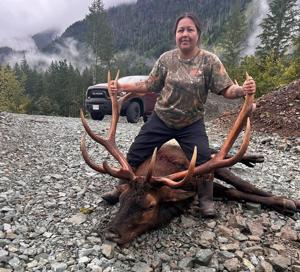Lifestyle
Tseshaht Women Harvest Roosevelt Elk, Nourish Community

Members of the Tseshaht First Nation, located on Vancouver Island, have made headlines for successfully harvesting two Roosevelt elk this fall, providing valuable food for their community. On September 27, 2023, Leisa Hassall shot a four-by-four bull elk in the Comox Main area, followed by Sylvia Dick, who harvested a seven-by-seven Imperial elk in the Taylor Arm area on September 29, 2023.
Hassall expressed deep gratitude for the experience, stating, “When I harvest animals, I am always thanking the Creator.” She highlighted the significance of traditional prayers and cultural connections during the hunt. Accompanied by her husband, John Morgan Hassall, and her brother, Jordan Dick, she described the moment her elk fell, emphasizing the need for safety and respect in hunting practices. “I should have been more careful,” she reflected, acknowledging a lesson learned after the elk attempted to flee when she approached too quickly.
The Tseshaht First Nation allocates four elk tags annually, with approximately 30 to 40 members entering a draw for the chance to hunt. The successful hunters keep half of the meat, while the other half is distributed to the community of about 1,267 members. Dick had participated in the draw for over a decade without success before finally being selected this year. “I had a feeling this year I was going to get picked, and sure enough, I got picked,” she said, commenting on the significance of her harvest.
Both Hassall and Dick come from families with a rich history of hunting and fishing. They fondly recalled their childhood experiences of waiting on logging roads while male relatives hunted. For Hassall, the preparation leading to her successful hunt included scouting locations with her 11-year-old son, Riley Hassall. “I come from Tseshaht First Nation, and we respect the territories,” she remarked, emphasizing the importance of teaching the next generation about sustainable hunting practices and cultural heritage.
Hassall noted that the elk meat, which includes steaks, roasts, and ground elk, will sustain her family for up to three years. “It’s so lean. It’s so tender,” she described, adding that her children appreciate the traditional food. Her son, Riley, has developed a strong connection to where his food comes from, preferring the taste of fish he catches himself over store-bought meat.
Dick shared her portion of the elk with approximately ten families from the community, stating, “I shared my half with people that were close to me. I even gave more than half to the band.” Meanwhile, Hassall preserved parts of the elk, such as the stomach lining for traditional skincare and the heart for an elder, showcasing their commitment to cultural practices.
The Roosevelt elk population on Vancouver Island is currently considered stable to increasing, according to the B.C. Ministry of Forests, Lands and Natural Resource Operations. The population is estimated to be between 5,600 and 6,300, following successful transplants from Vancouver Island to other areas. Nonetheless, challenges such as unregulated hunting, predation, and habitat degradation pose ongoing threats.
Moving forward, both Hassall and Dick look forward to future elk hunts, although they will not participate in next year’s draw due to Tseshaht regulations that prevent members from winning elk tags in consecutive years. Their recent hunts not only provided sustenance for their families but also reinforced a sense of community and cultural identity among Tseshaht members.
-

 Education3 months ago
Education3 months agoBrandon University’s Failed $5 Million Project Sparks Oversight Review
-

 Science4 months ago
Science4 months agoMicrosoft Confirms U.S. Law Overrules Canadian Data Sovereignty
-

 Lifestyle3 months ago
Lifestyle3 months agoWinnipeg Celebrates Culinary Creativity During Le Burger Week 2025
-

 Health4 months ago
Health4 months agoMontreal’s Groupe Marcelle Leads Canadian Cosmetic Industry Growth
-

 Science4 months ago
Science4 months agoTech Innovator Amandipp Singh Transforms Hiring for Disabled
-

 Technology4 months ago
Technology4 months agoDragon Ball: Sparking! Zero Launching on Switch and Switch 2 This November
-

 Education4 months ago
Education4 months agoRed River College Launches New Programs to Address Industry Needs
-

 Technology4 months ago
Technology4 months agoGoogle Pixel 10 Pro Fold Specs Unveiled Ahead of Launch
-

 Business3 months ago
Business3 months agoRocket Lab Reports Strong Q2 2025 Revenue Growth and Future Plans
-

 Technology2 months ago
Technology2 months agoDiscord Faces Serious Security Breach Affecting Millions
-

 Education4 months ago
Education4 months agoAlberta Teachers’ Strike: Potential Impacts on Students and Families
-

 Education3 months ago
Education3 months agoNew SĆIȺNEW̱ SṮEȽIṮḴEȽ Elementary Opens in Langford for 2025/2026 Year
-

 Science4 months ago
Science4 months agoChina’s Wukong Spacesuit Sets New Standard for AI in Space
-

 Technology4 months ago
Technology4 months agoWorld of Warcraft Players Buzz Over 19-Quest Bee Challenge
-

 Business4 months ago
Business4 months agoNew Estimates Reveal ChatGPT-5 Energy Use Could Soar
-

 Business4 months ago
Business4 months agoBNA Brewing to Open New Bowling Alley in Downtown Penticton
-

 Business4 months ago
Business4 months agoDawson City Residents Rally Around Buy Canadian Movement
-

 Technology4 months ago
Technology4 months agoFuture Entertainment Launches DDoD with Gameplay Trailer Showcase
-

 Technology2 months ago
Technology2 months agoHuawei MatePad 12X Redefines Tablet Experience for Professionals
-

 Technology4 months ago
Technology4 months agoGlobal Launch of Ragnarok M: Classic Set for September 3, 2025
-

 Technology4 months ago
Technology4 months agoInnovative 140W GaN Travel Adapter Combines Power and Convenience
-

 Top Stories3 months ago
Top Stories3 months agoBlue Jays Shift José Berríos to Bullpen Ahead of Playoffs
-

 Science4 months ago
Science4 months agoXi Labs Innovates with New AI Operating System Set for 2025 Launch
-

 Technology4 months ago
Technology4 months agoNew IDR01 Smart Ring Offers Advanced Sports Tracking for $169










